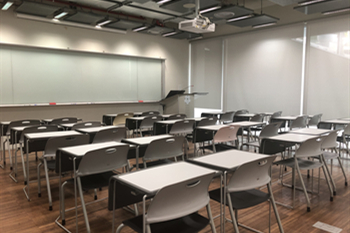
In the face of the unprecedented global pandemic, midterm exams this year were fraught with technical issues, confusing exam formats, cheating, and unclear guidelines. Now with the end of the semester fast approaching, there have been concerns about whether final exams will be held online or on-campus. In particular, the spate of confirmed cases of coronavirus near Ewha has raised concern over student safety.
The Office of Academic Affairs has advised that classes should avoid holding on-campus exams. Nonetheless, professors have the final call. At the same time, the school has also provided guidelines for students regarding on-campus classes and exams on the school website, in cases where on-campus exams are deemed inevitable.
RE:ON, the College of Science & Industry Convergence student council, conducted a survey to gather the opinions of students from their college regarding on-campus exams. Among 135 students with on-campus exams, 80.6 percent opposed on-campus exams, while only 7.4 percent supported this option. Students who disagreed with having on-campus exams argue that visiting the school poses a safety risk. On the other hand, students in favor of on-campus exams claim that it will be less confusing and will prevent students from cheating.
Other universities are also facing similar problems regarding exams. In Gachon University, a student who took an on-campus exam was found to be infected with COVID-19. Some universities have made efforts to avoid on-campus exams. Dongguk University has announced that final exams will only be held online or replaced with assignments. However, universities that have held online exams have been subject to criticism over allegations of widespread cheating.
In Inha University School of Medicine, a total of 91 freshmen and sophomores were caught cheating in their tests. These students met up in groups and shared their answers through social media. The disciplinary committee punished the students with a mark of zero on their tests.
As most schools are turning online, online exam applications such as Test Invite have been garnering attention. Such programs are similar to online TOEFL exams, offering live monitoring, unlimited simultaneous examination, and forced full-screen, locking down browsers while taking exams.
However, to some, on-campus exams are not only about the spread of coronavirus or concerns over cheating. Schools declaring virtual classes for the entire spring semester yet leaving it to professors to decide whether or not to hold on-campus exams is a hard pill to swallow for many students who reside outside of the Seoul Metropolitan Area.
“At the end of May, I was relieved to find out that my Spanish exam, which was originally planned to be held at school, is now going to be done online,” said Park Soo-a, a sophomore majoring in English Education. “It would have cost around 100,000 won per exam for me to commute to school if the announcements hadn’t come out earlier.” She currently resides in Gyeongsangnam-do which is a four-hour road trip from Seoul.
Shirin Cristina Elmi Flores, a sophomore in the Department of International Studies, returned to Korea from Mexico a day before the school’s announcement that all the courses will be switched online. The ticket cost around 1,000 USD, which is around 1.2 million won.
“I had to come back to Korea because the school was uncertain about whether they would switch online or not,” Elmi Flores said. “Just a week ago, it was announced that all of my courses will have online exams for the finals. No one was ready for this but if similar events ever happen again, the school should act faster. International students are not in the same position as local students and require a prompt answer to events like this.”

